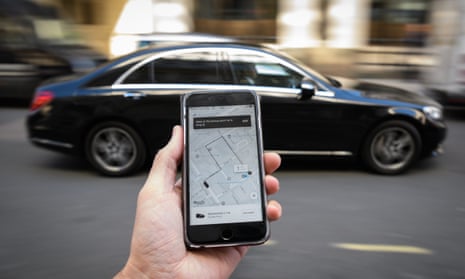Uber has lodged its legal appeal against Transport for London’s decision not to renew its private hire licence, as the ride-hailing app steps up its campaign to keep operating in one of its biggest markets.
Uber London filed papers with Westminster magistrates court in an attempt to reverse a ruling that it is not a “fit and proper” company to run taxi services in the capital.
Uber’s licence expired on 30 September, but Uber’s cars will remain available in London until the legal process is exhausted – potentially a year or more. A first hearing is likely to take place on 11 December, according to a judicial office spokesman.
The firm indicated that it hoped it would resolve its issues with TfL without going further down legal avenues, although the appeal was essential for its continued operations in the short term.
An Uber spokesperson said: “While we have today filed our appeal so that Londoners can continue using our app, we hope to continue having constructive discussions with Transport for London. As our new CEO has said, we are determined to make things right.”
Dara Khosrowshahi, Uber’s chief executive since September, has apologised for the company’s past actions and promised to change – a public statement welcomed by the mayor, Sadiq Khan.
The Uber boss came to London in early October for talks with the TfL commissioner that both sides described as “constructive”.
TfL had previously indicated that the “conduct and approach” of Uber had been an issue. The licence decision had cited concerns including Uber’s approach to reporting criminal offences, how it conducted medical and criminal checks on drivers, and whether software employed to evade regulation was being used in London.
Uber has also been criticised over its treatment of drivers, and is awaiting a separate tribunal ruling over the employment status of what it terms “partners”. It has been attempting to overturn a judgment that drivers – about 40,000 of whom work for Uber in London – have rights to paid holiday and the minimum wage.
The debate over Uber’s future has divided Londoners, with more than 850,000 people signing a petition urging the mayor to revoke the decision. However, polls have indicated a small majority back the decision to stop a firm that Khan said was not “playing by the rules”. Uber says 3.5 million people in London have downloaded its app and used it at least once in the past three months.
However, black-cab drivers argue that Uber is artificially driving down fares to a level that will not be sustainable in the long term. London authorities also have concerns over the number of licensed private hire drivers, which has risen by about 80% to 120,000 in the past four years.

Comments (…)
Sign in or create your Guardian account to join the discussion